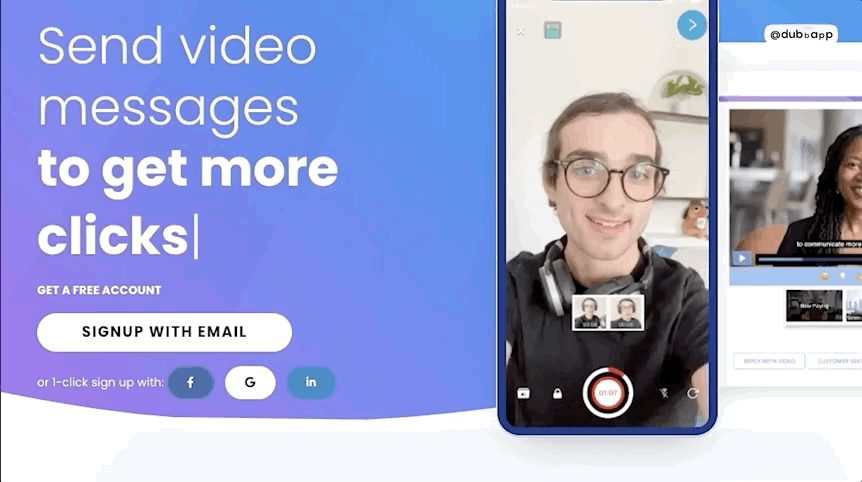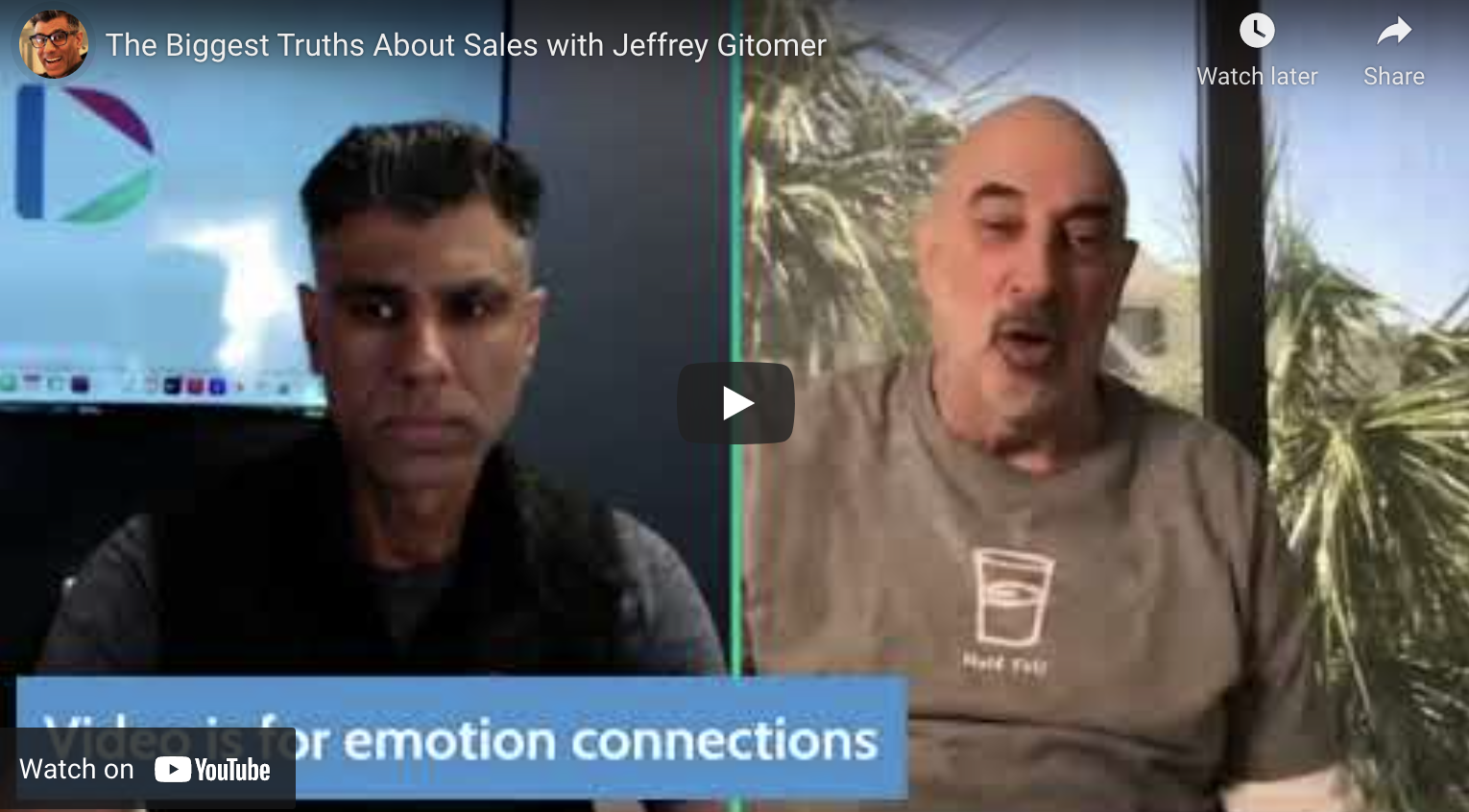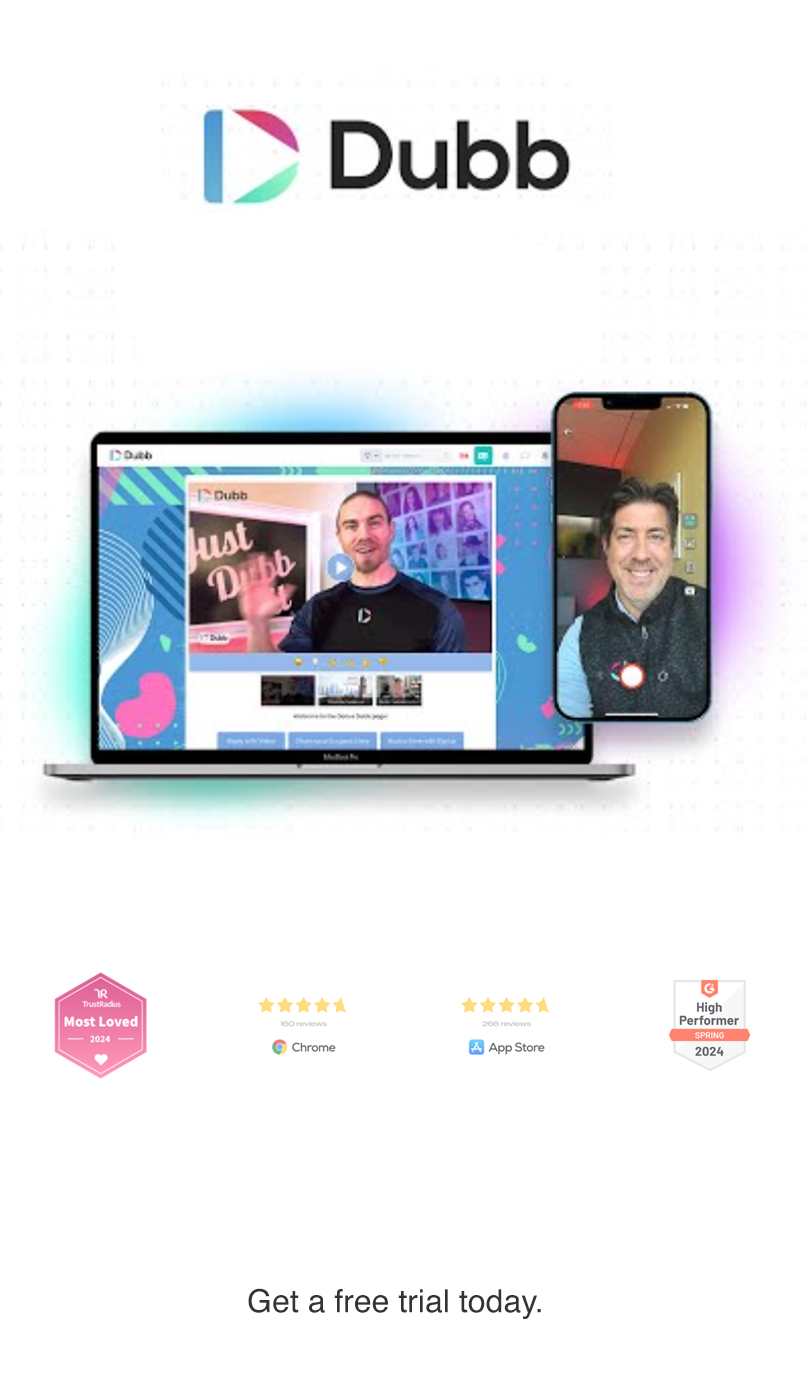Whether you are a sales leader in your organization or just started your sales career, there are certain truths about sales that we all need to recognize. These truths about sales may be obvious. Some of them may be uncomfortable. At their core, however, these are truths that will fundamentally affect the future of your business.
In the face of fundamental truths, it can be easy to get defensive. We may not want to hear about these truths because they speak to a core insecurity that we are feeling. We may even go farther and put on our metaphorical blinders. Even though we recognize that these truths will help us achieve our long-term goals, we may put them aside to stay within our comfort zones.
Ultimately, I want to take this blog post and discuss some of the biggest truths about sales. To help us in this task, I was excited to speak with Jeffrey Gitomer. Jeff is an author, professional speaker, and business trainer. He is a true expert on sales, customer development, and how we can better reach our sales goals. We can all learn something from Jeff, whether we want to more easily reach specified sales goals or just become more confident sales professionals.
Below, you will find some of the key takeaways from my conversation with Jeff. And if you’d like to learn more about sales or how you can reach your sales goal, I encourage you to check out Dubb. At Dubb, we are constantly thinking of ways that we can help our customers reach their business goals. Whether you are a solopreneur or work for a much larger company, we want to hear from you. Don’t hesitate to get in touch with us!

Why Salespeople Quit
One of the biggest truths about sales has to do with something that is unpleasant for salespeople and sales leaders alike. That is the fact why salespeople choose to quit, whether they are quitting a specific gig or quitting the sales profession entirely.
Clearly, there are idiosyncratic reasons why salespeople quit. There may be a special situation within a particular company that causes a stellar sales professional to look for greener pastures. But having said that, Jeff argues that there are several reasons.
The Fear of Rejection
First, salespeople quit because of rejection. They get sick of getting turned down by prospects. This can be especially true if the salesperson deeply feels that their product or service will provide immense value in their prospects’ lives. It can be frustrating, even demoralizing, to constantly receive “no’s” as they passionately deliver their pitches. While rejection is a natural part of being a salesperson, so many rejections within a certain period of time can take their toll.
So as sales professionals, how do we overcome this fear of rejection? Jeff said that the best way to overcome that fear is to eliminate it. You can eliminate this fear (or make a severe dent into it) by foregoing cold calls and seeking out referrals. Jeff often asks salespeople whether they would make 1,000 cold calls or have one referral. The answer is always one referral, but salespeople don’t do the obvious.
The simple reality is that salespeople don’t need substantial training to make a cold call. All they need to do is pick up the phone and start dialing. The ease of getting started is why so many salespeople still do it. But as you can guess, because it is so easy to pick up the phone and start dialing, it is extremely ineffective. Jeff says that it is the most destructive way to get in touch with sales prospects. If you call 20 people in the morning and all 20 say, “I’m not interested and don’t call me again,” it’s hard to not be demoralized by that.
Humor can help make the situation more tolerable. When Jeff used to cold call in downtown Charlotte, he would come across someone that said they were not interested in what he was selling. Jeff would then say, “Wow, that’s great. It usually takes me four responses of ‘not interested’ to get to one ‘interested.’ You’re only my second ‘not interested’ today. Do you know anyone else who may not be interested?” As Jeff says, this type of response turns the tables and will usually get a laugh. The laugh, in fact, gave him a second opportunity to sell to that prospect. While that second effort may not have paid off, it made the cold calling process slightly more palatable.
Ultimately, salespeople can get over this fear of rejection by deprioritizing cold calling. Generating business through referrals is not only less anxiety-inducing, but it is a more effective way of reaching your sales goals. The challenge is earning referrals, not asking for referrals. And the best way to earn referrals? It is by building trust.
This is another key truth about sales. Trust is at the core of any great business relationship. This is true whether you just met a prospect or have been working with a key customer for decades. Trust comes from helping that individual improve some aspect of her life. Sales leaders can do this by leading with value, whether that value comes from passing along an interesting and relevant article that you read or showing an existing customer how to better use your product or service. By leading with trust, you can get more of your business through referrals and avoid the dreaded cold calling that is still endemic within the sales universe.
Strained Relationships with the Boss
The second reason that salespeople quit is that they don’t get along with their bosses. By “bosses,” I also mean that salespeople may have issues with the organization as a whole.
It makes intuitive sense. As the old saying goes, “People don’t leave bad jobs. They leave bad bosses.” If you are working under a sales leader that micromanages you and adds undue stress to your life, you’ll find it much easier to leave your job and work somewhere else. On the flip side, if you have a great relationship with your boss and feel motivated and inspired in your work, you are, in all likelihood, going to stay. In fact, you’ll probably reach your sales goals and become an outstanding salesperson.
So what does this mean for you? If you are a sales leader that manages one (or several) salespeople in your office, recognize that your managerial style is going to play a huge role in your sales team’s future. Don’t be too overbearing and try to empower, rather than control, your sales team. Essentially, treat your colleagues the way that you would want to be treated if they were your boss.
And if you are a sales professional with a difficult boss? You’ve probably at least thought about leaving for another job (or leaving professional sales entirely). While you need to make the decision yourself, think about whether you simply need a change of scenery. Sometimes, leaving a toxic boss and going to work for a kind, inspiring, and motivating boss is just the thing you need to accelerate your career.
Sales is Meant For Video
Another one of the largest truths about sales has to do with, you guess it, video. Video is absolutely critical for today’s sales professionals. It is a tool that can help you build better relationships with your prospects, create even more value for your audience, and reach all of your sales goals.
There’s even better news for you. Video is significantly more important today versus just a few years ago. Simply put, it has become more acceptable.
As Jeff says, we have experienced two years of challenges. In some respect, we are still experiencing those challenges. At the same time, however, one of the silver linings has been that video is now more ubiquitous. Now, everyone uses it. We have all been on our fair share of Zoom calls, whether it was for work or for helping our kids get through school. Even if it doesn’t feel like we were creating video content, we certainly were taking advantage of many of the benefits that video has to offer.
By using video, we get to communicate in a way that simply can’t be replicated in text-based communication. We get to see how the other person responds to our message. We can read their body language and hear the intonations of their voice. Video is the medium that most closely replicates an in-person sales interaction. Even if you feel like you aren’t “natural” on camera, the reality is that you are likely more natural than you think. You don’t need to put on some act to appear “professional” on video sales calls. All you need to do is be yourself. Your audience, in fact, is expecting this from you. In most circumstances, they aren’t looking for someone that is extremely polished or salesy. Rather, they are expecting a normal, confident person who sincerely has their best interests at heart.
Now is the perfect time to embrace video for sales. The alternative (cold calling) is less than ideal. Nobody wants to be cold called right now (in fact, cold calls often appear as a “spam” message on our cell phones). On the other hand, by embracing video, you get to act like a human. You can more easily build real relationships with every single one of your prospects. This is one of the biggest truths about sales in today’s world, so make sure that you are incorporating video into your sales processes. You won’t be disappointed.

Video is for Emotional Connections
Another of the largest truths about sales has to do with this idea of text versus context. As Jeff says, he wants to have the ability to relate to a prospect in a way that he cannot achieve in text messages or emails. Here, he is specifically referring to the emotional connection that you can get in video-based communication.
With video, you have a fantastic chance to create an emotional connection with your viewer. It’s like what I was saying above: text-based communication doesn’t give you the options that video communication provides you. You may spend hours coming up with the perfect subject line, yet your email probably won’t have nearly the impact that a 30-second or one-minute video would. Ultimately, words on a page cannot convey the emotion and connection that you can establish through a video—no matter how brief that video is.
If you really think about it, the word “context” means “with text.” Something needs to come with text. If you decide to use text, you need to think about the value that you are adding with text. Adding video, for instance, to an email can help you bring that emotional connection that text is missing. It lets you form a real bond with your audience member, whether you just met her or have known her for some time.
When you are creating video content, it’s natural to think that you need to be scripted and buttoned up. The reality is that the strongest emotional connections can come from improvised or extemporaneous videos. In these types of situations, you are speaking directly to the camera, rather than reading off of a script or a teleprompter. While it may seem scarier at the time, speech directly from the heart can lead to some magical things.
Sure, there’s nothing stopping you from using a script or list of bullet points in your videos. In fact, what you can do is practice your script and re-record enough times so you can smoothly deliver your script without looking at it. With that said, if you’re up for it, there’s no stopping you from delivering a personal message without any extensive preparation. If you don’t like it, no problem. Simply delete the recording and try again. By doing this, you lower the stakes and can deliver a warm, heartfelt message.

Overcome the Fear of Getting Rejected
This discussion also leads to some other important truths about sales. The more vulnerable we make ourselves, the greater chance we have of making a connection. Along with this, the more rejection that we endure, the more of a connection that we need to heal ourselves. Nothing makes us forget about rejections more than actually making a connection. Connections cure rejections.
So what does this mean for you? Critically, it means that you shouldn’t shy away from video. The problem is that many people decide not to change and use new mediums like video because there is the fear of getting rejected. They may find it uncomfortable to create a video, put themselves out there by making it a more emotional video than they initially expected, and distribute it to their prospects.
There is some significant irony here. If you are making cold calls, for instance, the odds of you getting rejected are around 95%. Rejection is happening anyway. If you are making cold calls, you’ve probably been rejected 1,000 times (or even more). Why would you not take a chance on making a video that creates real value in your viewer’s life?
Ultimately, salespeople may still fear video because of the fear of the unknown. As Jeff says, you can think of fear as “false evidence appearing real.” This unknown can be scary and real, making it much less likely that you’ll take out your cell phone or camera and start recording. Or you may still be interested in making video content, but you decide to put it off for “another day.”
To combat these fears of the unknown and fear of rejection, you can do several things. To reiterate what I said above, don’t hesitate to practice. One of the coolest things about recording video content is that you can record a draft and then delete it. The only price for doing this is your time. Once you get in the habit of creating video content, it will become less scary—even if you don’t release your content to the world.
Beyond sheer practice, you can overcome your fear of rejection by taking small risks. Recording and deleting a piece of video content is one small risk. But taking it one step forward, you can take a small risk by sending a specific video to a close family member or friend. Go ahead and test it out in front of people that love you. It is a great way to get your feet wet in a low to zero-risk environment.
Then, think about how you’re going to respond to feedback. If you get some negative feedback, take it for what it’s worth and consider incorporating that feedback into your future videos. And if you receive positive feedback? Add that positive feedback to your “mental bank account” and draw on it when you are creating even more video content. Those feelings of confidence and positivity can be immensely helpful when you do decide to send one of your videos to a prospect or customer.
Importantly, recognize that video makes you less vulnerable. By becoming less vulnerable, you make more connections and, subsequently, endure fewer rejections. That is when you get over the learning curve and feel that fear of rejection dissipate. Sure, you may experience more rejections in the future, but you will be confident that your focus on vulnerability and connection-building will lead to more sales.
Focus on Quality, Not Quantity
Salespeople tend to feel this inherent need to speak with a certain number of people per day. The thought of, “I need to cold call 50 or 100 people this week” can be especially tempting. It can feel like we’re making progress by hitting these sorts of targets in a specific time period.
As Jeff says, however, salespeople need to have patience. You don’t need to make 100 cold calls today. Instead of thinking of it that way, what you need to do is make one sale today. And the best way to make that one sale? It is through investing time and effort into relationships with your prospects. You can easily do that by sending video content to your prospects. So long as you are providing value upfront, you will be in a great position to convert an interested prospect into a paying customer.
A useful analogy comes from TikTok. Most of us are on TikTok. If you have ever uploaded a video to TikTok, you probably wanted it to get plenty of views. For the more ambitious of us, we may have wanted that video to get millions of views. It has become part of our culture. That said, older people tend to look at younger people optimizing for views and think, “Why are you wasting your time trying to get views on social media? Why don’t you focus on the dollars, rather than the views?”
Ultimately, the views don’t necessarily convert into money. It may feel satisfying to get hundreds of thousands (or even millions) of views. There is definitely an ego boost here. Hitting these huge numbers can make it seem like you are making progress toward your goals. That being said, these positive feelings about ourselves don’t necessarily mean that we are going to make more sales.
Even if you aren’t on TikTok, keep this point in mind. Even though it may be self-satisfying to cold call a certain number of people per week or ensure that you reach out to at least 1,000 potential prospects per year, resist that temptation. Focus on quality over quantity when you are looking for new prospects. This is one of the bigger truths about sales that you should definitely keep in mind.
Consider Your Prospects’ Time
Finally, I want to touch on one of the more important truths about sales that salespeople may tend to forget. We intuitively know that our prospects are busy. They have so many obligations in their personal and professional lives. At the same time, as a sales leader, you need to interrupt your prospects’ days to talk about your product or service. In other words, you need to efficiently offer value in order to get the reward of a sale.
So what can you do? I think the rule of thumb is to embrace brevity. Generally speaking, a shorter video is better than a longer video. A shorter, impactful video tends to be much more effective than a longer, more rambling video. Jeff argues that your sales videos should be two minutes or less. While that may not be a hard and fast rule, the overall principle still applies. A short video shows that you respect your audience’s time. You don’t waste your audience’s time with information or arguments that can be left out. Instead, you include what is absolutely necessary and little else.
Shorter videos also make them better. To put it another way, constraints make you more creative. Because you only have a few minutes to articulate your message, you need to provide value in a succinct way. I’m not saying that it’s easy. In most circumstances, it is much tougher to summarize a sales pitch or other message in under two minutes. Even though it is more difficult, going through this process is absolutely beneficial. Not only will it make your prospect happy, but it will make your video content more effective and dramatically increase your chances of making a sale.
Creating a concise, valuable video can facilitate the sales process. For instance, what Jeff likes to do is lead with a video and then refer to a proposal. In other words, Jeff does not send a proposal with a video as an attachment. This strategy didn’t have the impact that he expected. In other words, it didn’t solidify the sale.
Then, Jeff decided to reverse the process. He chose to lead with the video and attached a proposal to the message. In the video itself, Jeff discussed the outcome that his prospect wanted to obtain. He also adds a testimonial video as an example of social proof. As you probably know, testimonial videos are terrific ways to show prospects that your product, service, or business is adding real value to customers’ lives. That testimonial video can mean the difference between making a sale and losing a lifelong customer.
At the same time, embracing brevity doesn’t mean that you need to be overly brief or quick in everything that you do. As just one example, Jeff chooses not to put prices in his proposals. Instead, he puts “to be determined” and uses the video to notify his prospect. He basically tells the prospect that he wants to directly speak with them about pricing and the outcome they have in mind. While this may take more time in the long run, he believes that it creates more value for him and the prospect.
In sum, the key lesson here is to embrace brevity. Sure, there may be situations where you can’t be brief. You may need to be more garrulous to complete the sale. With that said, keep this rule of thumb in mind. It both respects your audience and makes it more likely that you’ll reach your sales goals.
Keep These Truths in Mind
These truths about sales may seem simple or not overly complicated. However, it is their simplicity that makes them so powerful. You can rely on these truths about sales in virtually every circumstance. Whether you just started your sales career or are looking for a new way to reach your sales goals, I encourage you to keep Jeff’s wisdom in mind.
As far as video for sales, you’re still on the ground floor. There are a tantalizing amount of opportunities for a sales professional that wants to use video to achieve their sales goals. It’s a competitive environment where if you are one notch above your competition, you are ahead of around 97% of people in your marketplace. It is so obvious, ripe, and available, so go out there and take advantage of video.
If you want to learn more about some of these truths about sales and how you can use video within your business, I encourage you to contact us. Our team would be happy to speak with you about video, Dubb, and how you can get much closer to your sales goals.


